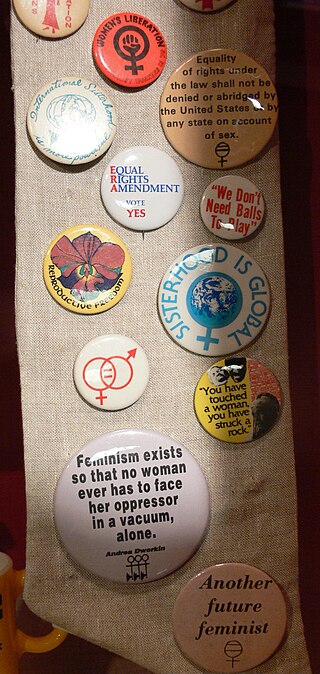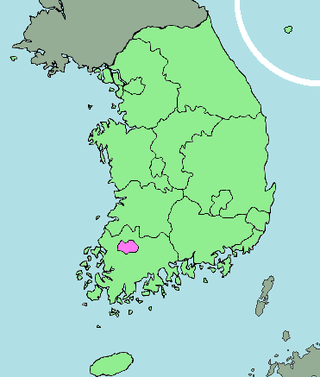Related Research Articles

Yonhap News Agency (연합뉴스) is a major South Korean news agency. It is based in Seoul, South Korea. Yonhap provides news articles, pictures and other information to newspapers, TV networks and other media in South Korea.
First-wave feminism was a period of feminist activity and thought that occurred during the 19th and early 20th century throughout the Western world. It focused on legal issues, primarily on securing women's right to vote. The term is often used synonymously with the kind of feminism espoused by the liberal women's rights movement with roots in the first wave, with organizations such as the International Alliance of Women and its affiliates. This feminist movement still focuses on equality from a mainly legal perspective.
Transnational feminism refers to both a contemporary feminist paradigm and the corresponding activist movement. Both the theories and activist practices are concerned with how globalization and capitalism affect people across nations, races, genders, classes, and sexualities. This movement asks to critique the ideologies of traditional white, classist, western models of feminist practices from an intersectional approach and how these connect with labor, theoretical applications, and analytical practice on a geopolitical scale.
Global feminism is a feminist theory closely aligned with post-colonial theory and postcolonial feminism. It concerns itself primarily with the forward movement of women's rights on a global scale. Using different historical lenses from the legacy of colonialism, global feminists adopt global causes and start movements which seek to dismantle what they argue are the currently predominant structures of global patriarchy. Global feminism is also known as world feminism and international feminism.
Amrita Basu is an American academic and political scientist. She currently is a professor at Amherst College where she holds affiliations in the departments of Political Science, Sexuality, Women's, & Gender Studies, Asian Languages & Civilizations, and Black Studies.

A variety of movements of feminist ideology have developed over the years. They vary in goals, strategies, and affiliations. They often overlap, and some feminists identify themselves with several branches of feminist thought.

The Women's International Democratic Federation (WIDF) is an international women's rights organization. Established in 1945, it was most active during the Cold War when, according to historian Francisca de Haan, it was "the largest and probably most influential international women's organization of the post-1945 era". Following the dissolution of the Soviet Union in 1991, its headquarters were moved from Berlin to Paris. In 2002, with the election of Márcia Campos as president, the office relocated to Brasília. Subsequently, in 2007 the WIDF secretariat was located in São Paulo. Since 2016, the president has been Lorena Peña of El Salvador. The WIDF's magazine, Women of the Whole World, was published in six languages: Arabic, English, French, German, Russian, and Spanish.
The Gia huấn ca is a 976-line Chinese language verse text traditionally ascribed to the Vietnamese Confucian scholar Nguyễn Trãi.
Feminism in South Korea is the origin and history of feminism or women's rights in South Korea.
Kwon In-sook is a former South Korean labor organizer who inspired women in South Korea to form the Korean Women's Associations United (KWAU). Kwon is the first woman to bring charges of sexual assault against the South Korean government. She was also considered by historian Namhee Lee to be "an emblematic figure of South Korea in the 1980s; she embodied the passion, the ideals, and the conflicting aspirations of the 1980s democratization movement." Kwon later became a feminist scholar in South Korea.
Korean Women's Associations United is an umbrella organization made up of 33 other associations in order to focus on women's issues in South Korea. Along with the Korean National Council of Women (KNCW), KWAU helps coordinate non-governmental organization activities dealing with women's issues and feminism throughout Korea.
The Korean Women Workers Association is an organization in South Korea dedicated to advancing the human rights for working women and promoting gender equality. KWWA offers leadership training and monitors the effects of government policies on women workers.

Vida Tomšič néeBernot was a Slovenian Partisan fighter during World War II, prominent communist politician, women's activist, and people's hero in postwar Yugoslavia. She was born and died in Ljubljana and held many government positions in Slovenia and Yugoslavia during her long career. Tomšič was a Marxist feminist who "saw women’s rights as strictly dependent on the social and economic development of the country as a whole."

Women's role in the Democratization of South Korea is a topic that has been rarely discussed and rarely acknowledged. Women's participation in civil society has contributed to the process of the development of democracy in South Korea. Additionally, the democratization movement can be described as the increasing participation of marginalized groups such as women. Having said that, democratization was an outlet for women to transform their grievances into actual collective action. With the help of democratization, these activisms were made possible because it opened up tons of opportunities for civil society. Unfortunately, although women have played a role in the Democratization of South Korea, there were still internal and external problems that hindered their growth and development.
Feminism and racism are highly intertwined concepts in intersectional theory, focusing on the ways in which women of color in the Western World experience both sexism and racism.
Chanyang-hoe or Chanyanghoe was a Korean feminist organization, founded in 1898. It has been referred to as the first women's organization in Korea. It aimed to erase the traditional discriminatory Confucian gender segregation by women's education. It has been called the beginning of the women's movement in Korea.
The Women's Association of Siam later known as Thai Women's Association of Thailand, was a women's organization in Thailand, founded in 1932.
The National Council of Women of Thailand (NCWT), is a women's organization in Thailand, founded in 1957.
Nu Cong Hoc Hoi, was a Vietnamese women's organization, founded in 1926. It was the first women's organization in Vietnam.
References
- ↑ Kauhanen, Katri (2020). "From Seoul to Paris: Transnational Character in the Work of the Korean National Council of Women in Authoritarian South Korea" . Positions: Asia Critique. 28 (3): 575–602. doi:10.1215/10679847-8315140. ISSN 1527-8271. S2CID 225478271.
- ↑ Mina Roces, Louise Edwards Women's Movements in Asia: Feminisms and Transnational Activism
- ↑ Kim, Seung-kyung; Kim, Kyounghee (2010). "Mapping a Hundred Years of Activism: Women's Movements in Korea". In Roces, Mina; Edwards, Louise (eds.). Women's Movements in Asia: Feminisms and Transnational Activism. New York: Routledge. pp. 189. ISBN 9780415487023.
- ↑ James E. Hoare Historical Dictionary of the Republic of Korea
- ↑ James E. Hoare Historical Dictionary of the Republic of Korea
- ↑ Korean "Comfort Women": Military Brothels, Brutality, and the Redress Movement